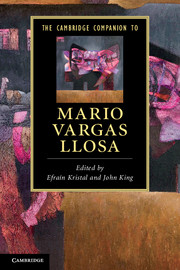Book contents
- Frontmatter
- Introduction
- 1 Reality and rebellion: An overview of Mario Vargas Llosa’s literary themes
- 2 The early novels: The Time of the Hero and The Green House
- 3 The total novel and the novella: Conversation in The Cathedral and The Cubs
- 4 Humour and irony: Captain Pantoja and the Special Service and Aunt Julia and the Scriptwriter
- 5 The historical novel: The War of the End of the World
- 6 Innocence and corruption: Who Killed Palomino Molero? and The Storyteller
- 7 The political novels: The Real Life of Alejandro Mayta and Death in the Andes
- 8 The erotic novels: In Praise of the Stepmother and The Notebooks of Don Rigoberto
- 9 The dictator novel: The Feast of the Goat
- 10 From utopia to reconciliation: The Way to Paradise, The Bad Girl and The Dream of the Celt
- 11 The essays
- 12 The memoir: A Fish in the Water
- 13 The plays
- 14 Film and the novels
- 15 An interview
- Further reading
- General index
- Index of selected fictional characters
- Index of selected works by Vargas Llosa
9 - The dictator novel: The Feast of the Goat
Published online by Cambridge University Press: 28 January 2012
- Frontmatter
- Introduction
- 1 Reality and rebellion: An overview of Mario Vargas Llosa’s literary themes
- 2 The early novels: The Time of the Hero and The Green House
- 3 The total novel and the novella: Conversation in The Cathedral and The Cubs
- 4 Humour and irony: Captain Pantoja and the Special Service and Aunt Julia and the Scriptwriter
- 5 The historical novel: The War of the End of the World
- 6 Innocence and corruption: Who Killed Palomino Molero? and The Storyteller
- 7 The political novels: The Real Life of Alejandro Mayta and Death in the Andes
- 8 The erotic novels: In Praise of the Stepmother and The Notebooks of Don Rigoberto
- 9 The dictator novel: The Feast of the Goat
- 10 From utopia to reconciliation: The Way to Paradise, The Bad Girl and The Dream of the Celt
- 11 The essays
- 12 The memoir: A Fish in the Water
- 13 The plays
- 14 Film and the novels
- 15 An interview
- Further reading
- General index
- Index of selected fictional characters
- Index of selected works by Vargas Llosa
Summary
Vargas Llosa has characterised himself as a ‘novelist intoxicated by reality, fascinated by the history being forged around us and by the past which still weighs so heavily upon the present’. This is an instructive description of the author of The Feast of the Goat (La fiesta del Chivo, 2000), a realist novel depicting historical events: the assassination in 1961 of the dictator Rafael Leónidas Trujillo Molina and the legacy of his regime, which was still very evident in the Dominican Republic in the 1990s,when some of its scenes are set.
Trujillo, known as ‘el Chivo’, both owing to his reputation as an indefatigable stud and because of the word's association with the Devil, ruled that country in person or by proxy from 1930 until his death. He was one of the most cynical, sanguinary and absurdly histrionic of twentieth-century dictators, creating a police state, terrorising his subjects through a network of thugs and informers, and accumulating political, legal, military and economic power that turned the Dominican Republic into his and his grasping family's private fiefdom. Even more sinister was the control his propaganda machine and cult of personality enabled this lethal megalomaniac to exert over the minds of his subjects. Trujillo was the creature of the USA, trained by the Marines and ruling with the support of successive administrations in Washington, which he was careful to cultivate by presenting himself as a bulwark against communism while bankrolling American politicians and opinion-formers.
- Type
- Chapter
- Information
- The Cambridge Companion to Mario Vargas Llosa , pp. 116 - 128Publisher: Cambridge University PressPrint publication year: 2011

